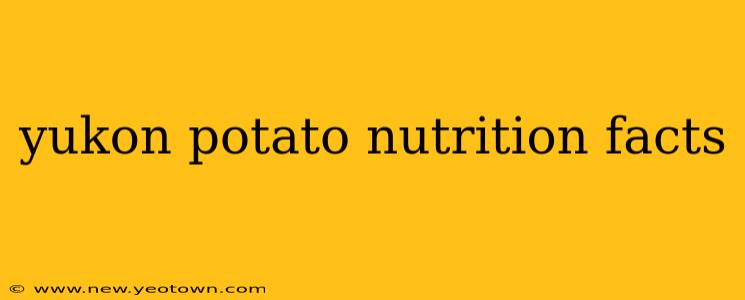The humble potato. Often overlooked, yet a versatile and surprisingly nutritious staple in countless cuisines worldwide. Today, we're diving deep into the nutritional profile of the Yukon Gold potato, a beloved variety known for its creamy texture and subtly sweet flavor. This isn't just a recitation of numbers; it's a story of how this unassuming spud can contribute to a healthy and balanced diet.
Imagine a crisp autumn day. You're walking through a farmer's market, the air filled with the earthy scent of freshly harvested produce. Your eyes land on a basket brimming with Yukon Gold potatoes, their golden skins gleaming under the sunlight. You reach out, selecting a few firm specimens, already picturing the delicious possibilities – creamy mashed potatoes, crispy roasted wedges, or even a hearty potato salad. But beyond the culinary appeal, lies a wealth of nutritional benefits waiting to be discovered.
What are the nutritional benefits of Yukon Gold potatoes?
Yukon Gold potatoes are a good source of several essential nutrients. A medium-sized baked Yukon Gold potato (about 5.3 ounces or 150 grams) provides a significant amount of:
- Potassium: Crucial for maintaining healthy blood pressure and fluid balance.
- Vitamin C: A powerful antioxidant that supports the immune system.
- Vitamin B6: Important for brain development and function, as well as red blood cell formation.
- Fiber: Promotes healthy digestion and helps regulate blood sugar levels.
- Manganese: Plays a role in bone health, wound healing, and metabolism.
Are Yukon Gold potatoes healthier than russet potatoes?
This is a common question, and the answer isn't a simple "yes" or "no." Both Yukon Gold and russet potatoes offer nutritional value, but their profiles differ slightly. Yukon Golds tend to have a slightly higher vitamin C content and a creamier texture due to a higher moisture content. Russets, on the other hand, are often preferred for baking due to their fluffy texture and higher starch content. The "healthier" choice depends on individual dietary needs and preferences. Both can be part of a healthy diet when consumed in moderation.
How many calories are in a Yukon Gold potato?
A medium-sized baked Yukon Gold potato contains approximately 161 calories. This calorie count can vary slightly depending on the size of the potato and preparation method. Adding butter, oil, sour cream, or cheese will significantly increase the calorie count.
Are Yukon Gold potatoes good for weight loss?
Potatoes, including Yukon Golds, can be incorporated into a weight-loss diet. Their fiber content promotes satiety, helping you feel fuller for longer. However, it's crucial to be mindful of portion sizes and preparation methods. Avoid excessive additions of high-calorie toppings.
What are the potential downsides of eating Yukon Gold potatoes?
While generally healthy, consuming excessive amounts of potatoes, including Yukon Golds, can contribute to weight gain due to their carbohydrate content. Additionally, some individuals might experience digestive discomfort due to the starch content. Moderation is key.
How can I prepare Yukon Gold potatoes for maximum nutritional benefit?
To maximize the nutritional value of your Yukon Gold potatoes, opt for healthier cooking methods such as baking, boiling, or steaming. Avoid frying, as this adds significant amounts of unhealthy fats and calories. Leaving the skin on during preparation also retains valuable fiber and nutrients.
In conclusion, the Yukon Gold potato is more than just a delicious culinary ingredient; it's a nutritious addition to a well-rounded diet. By understanding its nutritional profile and incorporating it mindfully into your meals, you can enjoy its creamy texture and subtle sweetness while reaping its health benefits. Remember, balance and moderation are key to a healthy lifestyle. So, the next time you see those golden tubers at the market, don't hesitate – embrace the nutritious and delicious world of the Yukon Gold potato!

